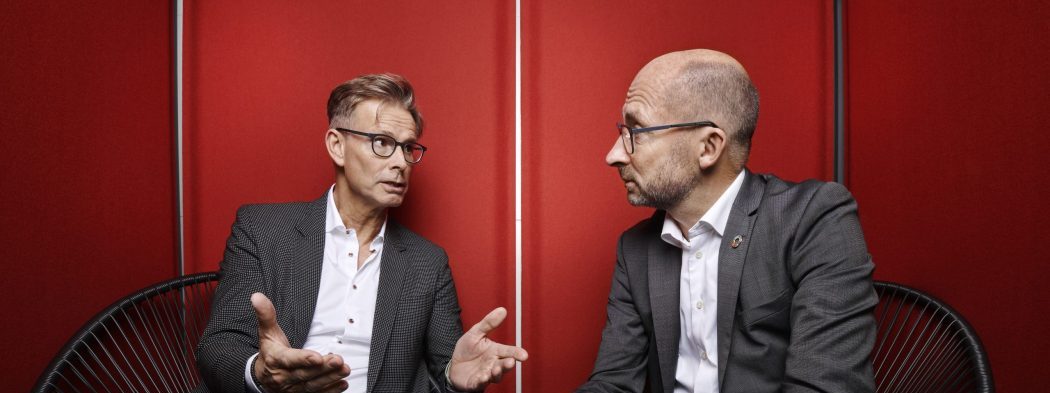In recent years, we have been confronted with one global crisis after another. The climate crisis, the biodiversity crisis, health crises and squeezed supply chains have now been supplemented by an energy crisis, a recession, inflation, and war in Europe.
”Geo and security politics have changed radically, and we are faced with a number of macroeconomic crises. However, at the top of the list is sustainability, where it is absolutely necessary that we recalibrate our society,” Thomas Hofman-Bang, CEO of the Danish Industry Foundation, comments.
New technology and innovation can contribute to solving global crises, and hardware startups will play a vital role in this.
”Awareness of climate change, and that we need to do something in regard to the entire sustainability agenda means that startups focusing on these issues have an advantage. We also see that many investments are directed towards these areas,” DTU Science Park’s CEO, Steen Donner, states.
Crises accelerate innovation
The energy crisis has made consumers aware of their energy consumption, and as a result, new technologies will emerge, according to Thomas Hofman-Bang.
”Keeping track of one’s energy consumption via apps has almost become a national pastime. The demand for energy saving solutions within the past few years has been somewhat stagnant, but I believe it will start moving now. The energy crisis is the push we’ve needed to innovate,” he says.
The health sector is also teeming with new technology, which is, to put it mildly, necessary.
“If you zoom in on Denmark for example, we are now experiencing a health sector that is on its knees and is lacking additional hands. However, no new hands are coming. So, we’re also dependent on new technology and innovation in this sector,” Thomas Hofman-Bang states, who also emphasizes the need to remove the multiple practical and regulatory barriers that impede new technology from being tested in clinics.
“But if someone manages to break through with a health technology, then something will happen,” Steen Donner argues.
Throughout the years, and particularly this year, many of the participating startups in Danish Tech Challenge, which the Danish Industry Foundation and DTU Science Park are behind, have developed hardware specifically within health technology.

New research we have conducted shows that between 15-20 per cent of participants in Danish Tech Challenge have been within MedTech. However, if you look at the overall valuation of previous participants, then they are responsible for 40-45 per cent of the overall value.
Steen Donner
CEO, DTU Science Park
A healthy correction
The economic crisis has meant that investors have held back a bit with funding. Valuations of new companies have fallen significantly. Somewhat surprisingly, the two CEOs says that this can actually be a positive thing.
This is because in contrast to many other industries, the startup scene within hardware and deep tech was not particularly negatively affected by the COVID-19 pandemic.
“There was a lot of money. Interest rates were low, and equity was high, so people almost didn’t know what they should do with their money,” Steen Donner explains.
“We also started to live even more digitally, which meant that startups have excellent conditions for developing their innovations and ideas even further. For them it wasn’t a huge impediment that physical meetings couldn’t take place,” Thomas Hofman-Bang says.
Therefore, the current economic crisis is not solely negative.
“We have had 10 years of favorable economic conditions. Now we might have a healthy correction. It is always unpleasant when this happens, and good things will likely collapse, but this is the reality we are facing right now,” Thomas Hofman-Bang states.
“Perhaps we have previously helped things survive that should have folded. The good projects will continue to receive funding. We are still seeing some interest from investors. There is still quite a bit of public funding for early-stage startups,” Steen Donner concludes.
About Danish Tech Challenge
Danish Tech Challenge is a five month intensive acceleration program where participants have access to sparring from mentors and advisors, a prototype workshop, investors and a grand prize – The Entrepreneur Award – from Industriens Fond worth DKK 500,000. Danish Tech Challenge was established in 2014 and is supporting hardware startups in bringing new products to the market. More than 100 startups apply each year. Danish Tech Challenge is run by DTU Science Park and supported by Industriens Fond.
Read more here.
The Danish Industry Foundation
A private philanthropic foundation that works actively to foster the competitiveness of the Danish business sector. The foundation focuses on four thematic areas: new technologies, sustainable production, internationalisation and cybersecurity.
Read more here.
DTU Science Park
Denmark’s leading deep tech community where startups, scale-ups, and established companies get help to realise their ambitions. Together with the Danish Industry Foundation, DTU Science Park organises Danish Tech Challenge, Denmark’s only hardware accelerator.
Read more here.
